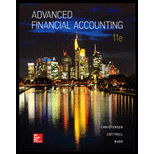
Advanced Financial Accounting
11th Edition
ISBN: 9780078025877
Author: Theodore E. Christensen, David M Cottrell, Cassy JH Budd Advanced Financial Accounting
Publisher: McGraw-Hill Education
expand_more
expand_more
format_list_bulleted
Textbook Question
Chapter 10, Problem 10.15Q
How do interperiod income tax allocation procedures affect consolidation entries in the period in which intercompany profits unrealized as of the beginning of the period are realized?
Expert Solution & Answer
Want to see the full answer?
Check out a sample textbook solution
Students have asked these similar questions
?!
What was the amount of credit sales?
Give me correct answer this financial accounting question
Chapter 10 Solutions
Advanced Financial Accounting
Ch. 10 - Prob. 10.1QCh. 10 - Why are dividend payments to noncontrolling...Ch. 10 - Prob. 10.3QCh. 10 - Why are changes in inventory balances not shown in...Ch. 10 - Prob. 10.5QCh. 10 - How is an increase in inventory included in the...Ch. 10 - What portion of the sales of an acquired company...Ch. 10 - Prob. 10.8QCh. 10 - Prob. 10.9QCh. 10 - Prob. 10.10Q
Ch. 10 - Prob. 10.11QCh. 10 - Prob. 10.12QCh. 10 - Prob. 10.13QCh. 10 - Prob. 10.14QCh. 10 - How do interperiod income tax allocation...Ch. 10 - How does the use of interperiod tax allocation...Ch. 10 - Prob. 10.17QCh. 10 - Prob. 10.18QCh. 10 - Prob. 10.19QCh. 10 - When a subsidiary’s convertible bond is treated as...Ch. 10 - Prob. 10.21QCh. 10 - What effect does the presence of a noncontrolling...Ch. 10 - Prob. 10.3CCh. 10 - Consolidated Cash Flows Analysis The consolidated...Ch. 10 - Prob. 10.1ECh. 10 - Prob. 10.2ECh. 10 - Prob. 10.3ECh. 10 - Prob. 10.4ECh. 10 - Prob. 10.5ECh. 10 - Direct Method Cash Flow Statement Using the data...Ch. 10 - Prob. 10.7ECh. 10 - Prob. 10.8ECh. 10 - Prob. 10.9ECh. 10 - Prob. 10.10ECh. 10 - Prob. 10.11ECh. 10 - Prob. 10.12ECh. 10 - Prob. 10.13ECh. 10 - Prob. 10.14ECh. 10 - Prob. 10.15ECh. 10 - Effect of Convertible Preferred Stock on Earnings...Ch. 10 - Prob. 10.17PCh. 10 - Prob. 10.18PCh. 10 - Prob. 10.19PCh. 10 - Prob. 10.20PCh. 10 - Prob. 10.21PCh. 10 - Prob. 10.22PCh. 10 - Prob. 10.23PCh. 10 - Prob. 10.24PCh. 10 - Prob. 10.25PCh. 10 - Prob. 10.26PCh. 10 - Prob. 10.27PCh. 10 - Prob. 10.29PCh. 10 - Prob. 10.30PCh. 10 - Prob. 10.31PCh. 10 - Earnings per Share with Convertible Securities...Ch. 10 - Comprehensive Earnings per Share Mighty...
Knowledge Booster
Learn more about
Need a deep-dive on the concept behind this application? Look no further. Learn more about this topic, accounting and related others by exploring similar questions and additional content below.Similar questions
- Please expert help mearrow_forwardgeneral accountarrow_forwardA company's Accounts Receivable balance at Dec. 31 was $120,000, and there was a debit balance of $600 in the Allowance for Doubtful Accounts. The firm estimates that 4% of the A/R will prove to be uncollectible. After the appropriate adjusting entry is made for estimated credit losses, what is the net realizable value of the accounts receivables at year-end?helparrow_forward
arrow_back_ios
SEE MORE QUESTIONS
arrow_forward_ios
Recommended textbooks for you
 Intermediate Accounting: Reporting And AnalysisAccountingISBN:9781337788281Author:James M. Wahlen, Jefferson P. Jones, Donald PagachPublisher:Cengage Learning
Intermediate Accounting: Reporting And AnalysisAccountingISBN:9781337788281Author:James M. Wahlen, Jefferson P. Jones, Donald PagachPublisher:Cengage Learning Financial Reporting, Financial Statement Analysis...FinanceISBN:9781285190907Author:James M. Wahlen, Stephen P. Baginski, Mark BradshawPublisher:Cengage Learning
Financial Reporting, Financial Statement Analysis...FinanceISBN:9781285190907Author:James M. Wahlen, Stephen P. Baginski, Mark BradshawPublisher:Cengage Learning College Accounting, Chapters 1-27AccountingISBN:9781337794756Author:HEINTZ, James A.Publisher:Cengage Learning,
College Accounting, Chapters 1-27AccountingISBN:9781337794756Author:HEINTZ, James A.Publisher:Cengage Learning,

Intermediate Accounting: Reporting And Analysis
Accounting
ISBN:9781337788281
Author:James M. Wahlen, Jefferson P. Jones, Donald Pagach
Publisher:Cengage Learning


Financial Reporting, Financial Statement Analysis...
Finance
ISBN:9781285190907
Author:James M. Wahlen, Stephen P. Baginski, Mark Bradshaw
Publisher:Cengage Learning


College Accounting, Chapters 1-27
Accounting
ISBN:9781337794756
Author:HEINTZ, James A.
Publisher:Cengage Learning,

How to (Legally) Never Pay Taxes Again; Author: Next Level Life;https://www.youtube.com/watch?v=q63F1pBrUHA;License: Standard Youtube License